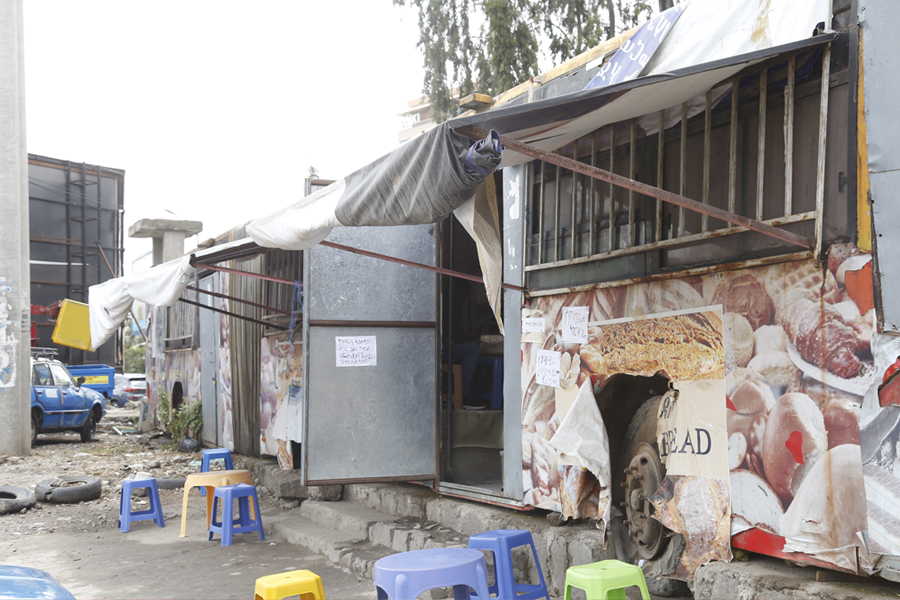
While strolling around Meskel Square last week, I came across a group of young men that were selling stewed corn.
Owing to the nostalgic relations of the snack with the rainy season, I went over and bought half an ear.
Corn and potatoes are signature dietary options, particularly during the rainy season in Ethiopia. They are quick and easy to make while providing a much-needed calorie at an affordable price. Corn on the cob is sold up to 20 Br for the ear.
The street vendors served it straight out of their improvised oven, wrapped in its own husk to prevent burns from the heat. The simple delicacy had a pleasant taste. While it may not be enough to fully satisfy hunger, it provides essential nutrition to ward off the chill.
Folklore has its own explanation for the start and end of the rainy season, which coincides with the September 11th Julian Calendar. Unfortunately, this day holds a tragic meaning for the United States but marks the beginning of a new year and the arrival of spring in Ethiopia.
The spring season is romanticised as a time of thankfulness that unravels a time of brightness filling the earth with tapestries of flowers and foliage whose fragrance inspires hope.
On the other hand, the rainy season which starts near July, peaks in August and lasts into early September is depicted as a time of hardship, waiting and perseverance where it becomes difficult to commute and socialise.
I observe that city dwellers are usually caught off guard whenever it rains. The unpredictable dark clouds may spell doom at any moment.
Children are spared of the effects as it coincides with their school break. It is rather a time of respite from the monotony of daily commute. However, for residents of Addis Abeba who use public transport that is riddled with overflowing demand and long queues, it brings a serious challenge.
Keeping a reliable umbrella comes in handy but they do not suffice on the worst of days when the pour teams up with strong winds and hailstorms. It demands a well-sealed pair of shoes not to feel the wetness and rough soles for a better grip on the slippery and muddy ground.
Poorly maintained house roofs start to give way to the water with pails serving as receptacles of the unwelcome intruder. I wonder how the lowest echelons of society get by with a struggle to find shelter. Having a roof over a head is given for some while it certainly is an unattainable luxury for others.
On one of those rainy days, I found myself in a popular bistro around Piassa. The rich history of the location dates back to the Italian invasion times. Although the city expanded, old Italian-style buildings and indigenous Ethiopian designs still stand. It is a gastronome paradise with notable brands such as Ristorante Castelli, Enrico Pastry, Omar Khayam, and Taytu Hotel.
The bustling Kiyab Cafe & Restaurant is one of the old heritage buildings. It features an open quadrangle design with a stairway leading to the basement lounge, complete with a small garden area.
It was crowded with people seeking refuge from the rain. The cosy atmosphere, fried potatoes aroma and hot beverages brought back fond memories of my university days.
I enjoyed the evening for a while before realising my abode was very far, and I outstayed my sojourn at the café. Nostalgia gave room to reality and I unfolded my reliable umbrella and strolled briskly to where I parked my car.
The stubborn rain, which made me barge into the café had not subsided yet.
As I drove through the Ras Mekonnen bridge towards Arat Kilo Square, my windshield wipers struggled to clear the continuous raindrops obstructing my view. The neighbourhood around me seemed frozen in time until I reached Urael Square.
The sound of the Addis rain played in the background, soothingly tapping on the windshield. Despite the inconveniences, I felt grateful for the moderate weather all year round, considering the heat wave affecting the Mediterranean regions.
I recall reading a story where a tramp, afraid of the upcoming rainy season decides to commit a petty crime intending to pass the time in the penitentiary. In a humorous turn of events, he was granted his wish and jailed after a few attempts.
As he thankfully welcomes his brief jail term a twist of fate gets him mistaken for an escaped inmate on death row. The unfortunate man finds himself on a countdown to capital punishment pending in a few days' time to be again rescued by yet another clever twist in the plot. He receives an innocent verdict and leaves the prison gracefully embracing the dreadful prospect of being out in the rain.
In life, we often overlook things that we should be grateful for.
Amidst the challenges, opportunities come in an agrarian nation where much of the population depends on seasonal rains for harvest. For city residents, it provides a calm space and a chance for relaxation where they spend time indoors.
The heavy rains in Addis Abeba could be seen as a blessing, considering the wide range of extreme weather conditions. Seasons come and go, like the verses of a poem, and follow the cycles of life year after year.
PUBLISHED ON
Jul 29,2023 [ VOL
24 , NO
1213]


Addis Fortune | May 11,2024

Editorial | May 24,2025

Commentaries | Feb 01,2019

Exclusive Interviews | Jan 05,2020

Life Matters | Feb 04,2023

Sunday with Eden | Mar 16,2024

Radar | Dec 10,2022

Addis Fortune | Oct 30,2022

Featured | May 03,2024

Fortune News | Jul 22,2023

Dec 22 , 2024 . By TIZITA SHEWAFERAW
Charged with transforming colossal state-owned enterprises into modern and competitiv...

Aug 18 , 2024 . By AKSAH ITALO
Although predictable Yonas Zerihun's job in the ride-hailing service is not immune to...

Jul 28 , 2024 . By TIZITA SHEWAFERAW
Unhabitual, perhaps too many, Samuel Gebreyohannes, 38, used to occasionally enjoy a couple of beers at breakfast. However, he recently swit...

Jul 13 , 2024 . By AKSAH ITALO
Investors who rely on tractors, trucks, and field vehicles for commuting, transporting commodities, and f...

Jun 28 , 2025
Meseret Damtie, the assertive auditor general, has never been shy about naming names...

Jun 21 , 2025
A well-worn adage says, “Budget is not destiny, but it is direction.” Examining t...

Jun 14 , 2025
Yet again, the Horn of Africa is bracing for trouble. A region already frayed by wars...

Jun 7 , 2025
Few promises shine brighter in Addis Abeba than the pledge of a roof for every family...